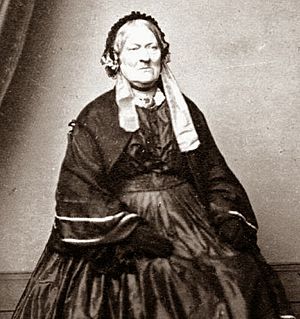Lilly Maxwell facts for kids
Quick facts for kids
Lilly Maxwell
|
|
|---|---|

c.1867
|
|
| Born | c.1800 |
| Died | 1876 |
| Nationality | British |
| Known for | early female voter |
Lilly Maxwell (around 1800 – 1876) was a British woman who became famous for trying to vote. She is known as an early suffragist, which means she supported women getting the right to vote. Her attempt to vote in Manchester led to an important court case that helped highlight the issue of women's voting rights.
Contents
Who Was Lilly Maxwell?
Her Early Life and Shop
Lilly Maxwell was born around the year 1800 in Scotland. She first worked as a servant in people's homes. Later, she opened her own shop in Chorlton-on-Medlock, Manchester. She sold different items there, like dishes and other goods.
At that time, only men who owned or rented property above a certain value were allowed to vote. Lilly rented a shop and house that were valuable enough. Because of this, her name accidentally appeared on the list of voters for Manchester. People thought "Lilly" was a man's name.
How Her Vote Happened
A man named Jacob Bright discovered Lilly's name on the voting list. He was a candidate for election and strongly supported women's right to vote. Jacob Bright and his wife, Ursula Mellor Bright, helped start a group called the National Society for Women's Suffrage in Manchester in 1867.
Bright's team told Lydia Becker about Lilly Maxwell. Lydia Becker was the secretary of the women's suffrage society. She then told Lilly Maxwell about the mistake and encouraged her to try and vote.
Voting Before Lilly Maxwell
Lilly Maxwell was not the very first woman to vote in Britain. Records show that some women had voted before, for example, about thirty women in Lichfield in 1843. These women, like Lilly, owned property and ran their own households. However, after the Reform Act 1832, voting was specifically limited to "male persons." This made Lilly's case very important.
Lilly Maxwell's Historic Vote
On November 26, 1867, Lilly Maxwell made history. She became the first woman known to vote in a parliamentary election since the 1832 law. This happened during a special election in Chorlton-on-Medlock. The person in charge of the election, called the returning officer, allowed her to vote at the Town Hall.
Lilly Maxwell cast her vote for Jacob Bright, the candidate who supported women's voting rights. In those days, people had to say their vote out loud. A famous magazine called Punch even wrote a short poem about her vote. Bright himself mentioned Lilly's vote in his speech after winning. He said she was "a hardworking honest person, who pays her rates as you do." This meant she paid her taxes just like men did.
The Court Case That Followed
After Lilly's vote, Lydia Becker encouraged many other women to try and get their names on the voting lists. About 5,346 female heads of households applied.
These applications led to a major court case called Chorlton v. Lings on November 2, 1868. Important lawyers, Sir John Coleridge and Richard Pankhurst, presented the case. The law was not very clear because it used the word "man" instead of "male." This made it confusing whether women could vote.
However, the court decided that women could not vote in British elections. This ruling meant that women would have to continue fighting for their right to vote for many more years.
Later Life
Lilly Maxwell passed away in October 1876. Towards the end of her life, she had to go to Withington workhouse because she had no other way to support herself.
See also
 In Spanish: Lilly Maxwell para niños
In Spanish: Lilly Maxwell para niños
 | Stephanie Wilson |
 | Charles Bolden |
 | Ronald McNair |
 | Frederick D. Gregory |

